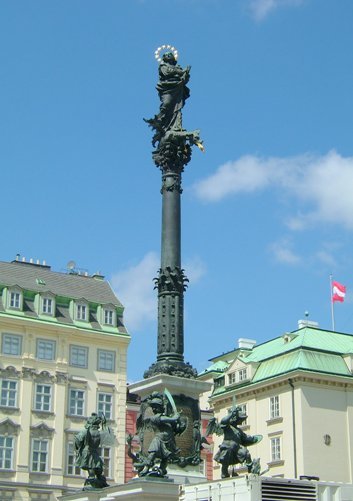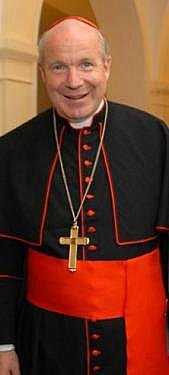| | |
| Written by Luiz S. Solimeo | ||||
| | ||||
| Scandalous Statements by the Cardinal-Archbishop of Vienna Recent statements on homosexuality and divorce attributed to the Archbishop of Vienna, Christoph Cardinal Schönborn are making waves all over the United States, particularly among the liberal media, progressive Church circles and homosexual activists.1
Speaking to a group of Austrian journalists on April 28, the prelate is quoted making confusing and compromising statements on homosexuality and divorce. On that occasion he is said to have also criticized by name Cardinal Angelo Sodano, former Secretary of State to Pope John Paul II and now dean of the College of Cardinals, accusing him “of complicity in the cover-up of sexual abuse allegations against his predecessor as the most important figure in the Austrian church.”2 Despite the reverberation in the media, and although more than two weeks have elapsed since the press conference, I am not aware that Cardinal Schönborn has yet denied having made these statements.3 Marriage and Homosexual Partnership have Nothing in Common The statements by the Cardinal Archbishop of Vienna were first published by the Austrian Catholic news agency Kathpress and spread by the media.4 According to London’s The Tablet, “Questioned on the Church’s attitude to homosexuals, the cardinal said: ‘We should give more consideration to the quality of homosexual relationships,’ adding: ‘A stable relationship is certainly better than if someone chooses to be promiscuous.’”5 “Quality” is this statement’s operative word. It suggests there is a difference in “quality” between homosexual relations inside and outside a stable relationship, deserving therefore, a different moral evaluation, just as occurs in heterosexual relations inside and outside the bonds of matrimony. Indeed, sexual intercourse between a man and a woman has a different quality or moral nature when engaged inside and outside marriage. When engaged in a natural way inside marriage, it is apt to attain its end, that is, procreation and raising children, and is therefore legitimate; when engaged in outside of marriage (or inside but in an unnatural way), it goes against its end and is therefore illegitimate and sinful. Since the homosexual act is of itself incapable of procreation and a homosexual relationship is morally inadequate for the bringing up of children, its “quality” or nature never changes: it is always an illegitimate and sinful act, contrary to nature.6 In the context of the present drive to equate stable homosexual relations with marriage – already supported by laws in many jurisdictions – a defense of such relationships is tantamount to supporting that drive.
The Church Cannot Change Her Position on Divorce In his conversation with journalists, “[t]he cardinal also said the Church needed to reconsider its view of re-married divorcees ‘as many people don’t even marry at all any longer’. The primary thing to consider should not be the sin, but people’s striving to live according to the commandments, he said. Instead of a morality based on duty, we should work towards a morality based on happiness, he continued.”7 What does it mean for the Church to “reconsider its view of re-married divorcees”? The following sentence attributed to Cardinal Schönborn (“the primary thing to consider should not be sin but people striving to live according to the commandments”) appears to indicate that it is a change regarding the prohibition for divorced and “remarried” Catholics to receive Communion. Indeed, since according to traditional morals marriage is indissoluble, a person who weds again after breaking his or her marriage is not really married but living in concubinage. It is an objectively sinful situation, and it bars the person from receiving Holy Communion.8 To allow persons in such circumstances to receive Communion implies that they are not in the state of sin. Now then, such an attitude, at least implicitly, appears to deny the principle of the indissolubility of matrimony; for the only way they would not be in a state of sin is if their earlier marriage no longer existed. But the indissolubility of marriage, even natural marriage, is a principle that derives from the natural Law9 and therefore the Church could not ignore that indissolubility even indirectly, by treating persons in concubinage as if they were legitimately married. For, as Pope Paul VI recalled in the Encyclical Humanae Vitae, the Church is the custodian and interpreter of natural law, not its creator. For this reason, She cannot modify it.10 Destruction of Objective Morals The Vienna prelate’s assertion that “[t]he primary thing to consider should not be the sin, but people’s striving to live according to the commandments” would imply switching the focus from an objective moral norm – the obedience due to divine and natural law – to a subjective one: the effort a person makes, even if he does not succeed. Moral law would thus cease being the objective standard to judge the legitimacy or illegitimacy of human actions, giving way to a merely subjective criterion impossible to gauge. In fact, how does one objectively gauge someone’s inner effort to do something or avoid it? One thus switches from an objective and universal morality based on clear and rational principles, to a subjectivist relativism that destroys the whole ethical order. Furthermore, this whole concept is naturalistic and denies the principle that God does not fail to help, with His grace, those who truly strive to attain an upright end.11 Finally, to propose a morality where happiness clashes with duty is to propose a contradiction. True happiness, as even pagan philosophers understood, results from the practice of virtue.12 On a superior plane, happiness is related with man’s ultimate end – eternal bliss – which cannot be attained without obedience to divine Law. Of course we will not delve into the Cardinal-Archbishop of Vienna’s subjective intentions, which God alone can judge. But we cannot but lament the effect of the statements attributed to him, and which it seems he has not yet denied. Footnotes1. Cf. Cathy Lynn Grossman, “Cardinal's surprising new tune: ‘Don't worry, be happy,’” USA Today (Faith & Reason) May 8, 2010, http://content.usatoday.com/communities/Religion/post/2010/05/gay-marriage-divorce-catholic-church/1; Tim Rutten, “Changing the church – Recent statements and writings show that there is support within the church for reform,”Los Angeles Times, May 12, 2010, http://www.latimes.com/news/opinion/commentary/la-oe-0512-rutten-20100512,0,7587200.column ; James Martin, S.J., “Schonborn Attacks Sodano; Calls for New Look at Gays and Remarried Catholics,” America (In All Things), May 7, 2010, http://www.americamagazine.org/blog/entry.cfm?blog_id=2&entry_id=2858; Andrew Sullivan, “The Quote for the Day – II, Tips-Q, May 10, 2010,http://www.tips-q.com/news/msm/2100301-quote-day-ii ; Michael A. Jones, “A Catholic Bishop in Favor of Gay Relationships?” Gay Rights, May 7, 2010, http://gayrights.change.org/blog/view/a_catholic_bishop_in_favor_of_gay_relationships; Edge Boston, “Cardinal Schönborn: Church Should Respect Long-Term Gay Relationships,” GLAA Forum, May 11, 2010, http://www.glaaforum.org/glaa_forum/2010/05/cardinal-sch%C3%B6nborn-church-should-respect-longterm-gay-relationships.html; terence@queerchurch, “Cardinal Schonborn on Church Reform: No Refutation (Yet),” Queering the Church – Toward a Reality Based Theology, May 10, 2010, http://queering-the-church.com/blog/?p=7822#more-7822; gaycatholic, “Is the Catholic Church Rethinking Homosexuality, Divorce?” Street Prophets – A Daily Kos Community, May 11, 2010, http://www.streetprophets.com/storyonly/2010/5/11/12544/8763 . [back]2. John L. Allen Jr., “‘The days of cover-up are over,’ Schönborn,”National Catholic Reporter, May 10, 2010,http://ncronline.org/news/accountability/days-cover-are-over-sch%C3%B6nborn; Cf. Philip Pullella, “Cardinal accuses Vatican official of abuse cover-up,” Reuters, May 9, 2010, http://www.reuters.com/article/idUSTRE6481D420100509. [back] 3. The interpretation of the words of the cardinal made by Fr. Joseph Fessio, S.J. expresses only the thought of the illustrious Jesuit and not that of the Archbishop of Vienna himself, who has not clarified before the public his thoughts on this very delicate matter. (Father Joseph Fessio, S. J., “Guestview: No Good Deed Goes Unpunished,” May 11, 2010, http://blogs.reuters.com/faithworld/2010/05/11/guestview-no-good-deed-goes-unpunished/). [back] 4. For Vaticanologist Andrea Tornielli, the fact that the cardinal’s words were published by the Austrian Catholic news agency Kathpress guarantees their fidelity (Cf. “Schoenborn attacca Sodano: ‘Non volle indagare su Groer,’”, Il Giornale, May 10, 2010, http://blog.ilgiornale.it/tornielli. [back] 5. ChristaPongratz-Lippitt, “Schönborn attacks Sodano and urges reform,” The Tablet (Church in the World), May 8, 2010, http://www.thetablet.co.uk/article/14678 (Our emphasis.) [back] 6. Cf. Saint Thomas Aquinas, “The Reason Why Simple Fornication Is A Sin According To Divine Law, And That Matrimony Is Natural,” Summa Contra Gentiles, Bk. 3, q. 122, at http://dhspriory.org/thomas/ContraGentiles3b.htm#122 ; Catechism of the Catholic Church, no. 2357. [back] 7. Pongratz-Lippitt, “Schönborn attacks Sodano and urges reform,” The Tablet, May 8, 2010, http://www.thetablet.co.uk/article/14678 (Our emphasis.) [back] 8. “Can. 915: Those who have been excommunicated or interdicted after the imposition or declaration of the penalty and others obstinately persevering in manifest grave sin are not to be admitted to holy communion.” [back] 9. Cf. Victor Cathrein, S.J., Philosophia Moralis, (Barcelona, Editorial Herder, 1945), p. 365, n. 527; St. Thomas Aquinas, “That Matrimony Should Be Indivisible,” Summa Contra Gentiles, Bk. 3, q. 123, at http://dhspriory.org/thomas/ContraGentiles3b.htm#123. [back] 10. Paul VI, Enc. Humanae Vitae, nn. 4 and 18, at http://www.vatican.va/holy_father/paul_vi/encyclicals/documents/hf_p-vi_enc_25071968_humanae-vitae_en.html [back] 11. “Facienti quod in se est, Deus non denegat gratiam.” [‘God does not deny grace when one makes the due effort.”] J. Van der Meersch, s.v. “Grace,” Dictionnaire de Théologie Catholique, (Paris: Letouzey et Ané, 1947), Vol. VI, Part II, col. 1603. [back] 12. Cf. Aristotle, Nicomachean Ethics,at http://classics.mit.edu/Aristotle/nicomachaen.8.viii.html [back] |



Thank You! It takes Courage these days to support the teachings of the Church. Speaking of Courage, the only ministry to persons with same-sex attraction that is faithful to church teachings,
ReplyDeletehttp://www.couragerc.org and encourage, for the spouses, parents, and children of those who think of themselves as entitled to this acting out of sin. Pray for Courage!
1